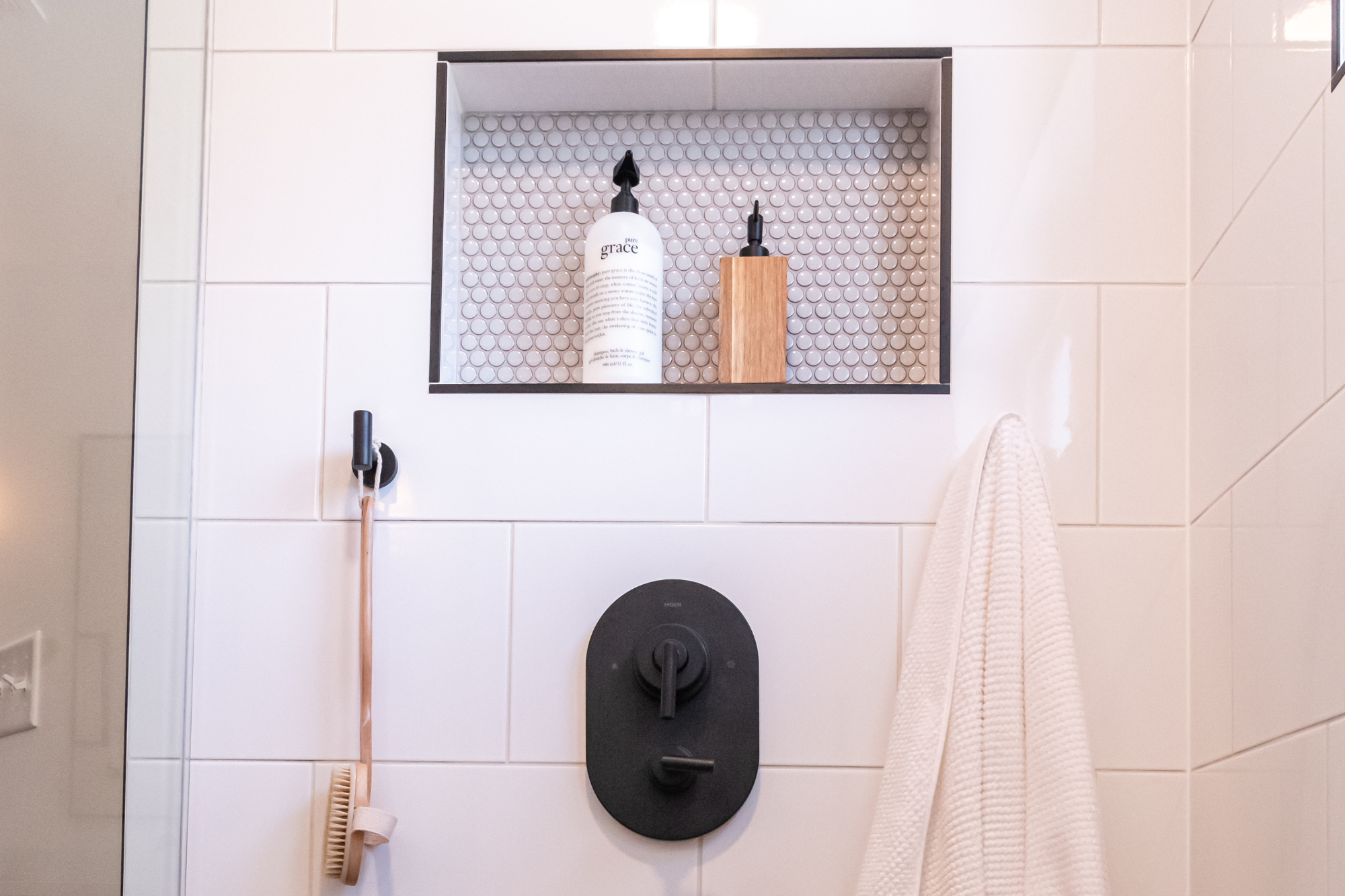When it comes to choosing the right materials for your shower, two of the most common choices are ceramic and porcelain tiles. If you’re looking for a shower replacement in Milwaukee, WI, you may be debating the merits of these two popular options. While both materials are widely used in bathroom construction, each has its own distinct qualities that may make it a better fit depending on your needs and preferences. Let’s explore the differences between ceramic vs porcelain tiles for showers, helping you make an informed decision for your next shower renovation with The Tile Group.
What to Look For in Shower Tiles
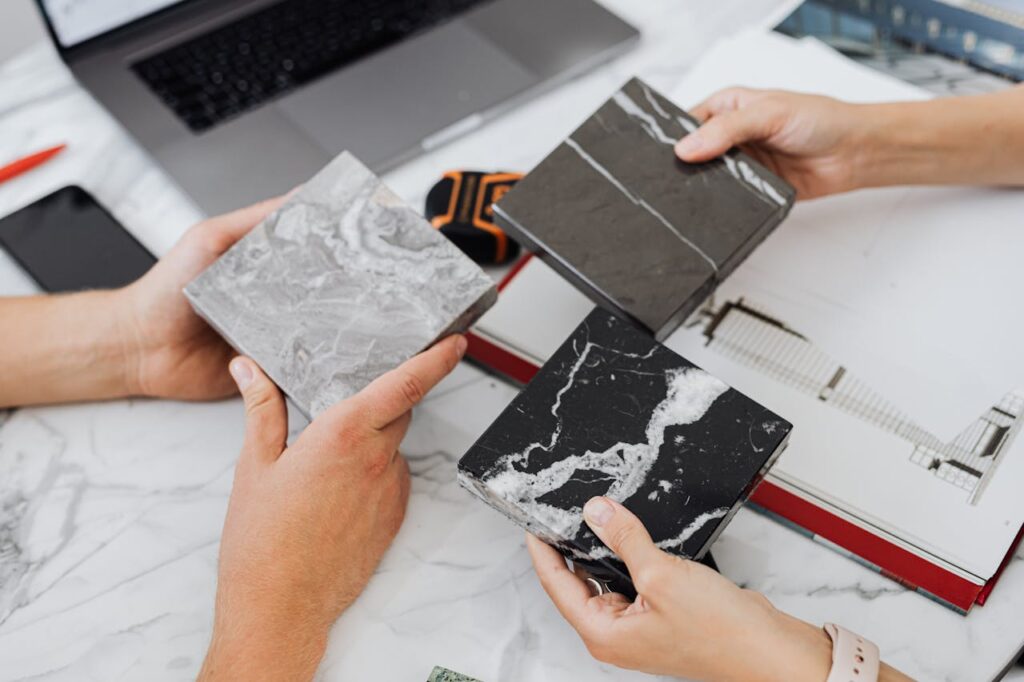
Before diving into the specific differences between ceramic and porcelain tiles, it’s important to understand what you should look for when selecting tiles for your shower. Here are some characteristics shower tiles should have:
- Water resistance: A shower is one of the most moisture-exposed areas in a home, so you should prioritize the ability to resist water in yoru tile selection.
- Aesthetic appeal: The tile’s color, texture, and overall design should complement your bathroom’s style while providing a practical surface for daily use.
- Slip-resistance: Ensure the material has good traction in moisture to avoid accidents in wet conditions.
- Durability: Make sure you pick a strong tile material, especially if you want your shower to last for many years without needing frequent repairs or replacements.
With these factors in mind, let’s break down the pros and cons of ceramic and porcelain tiles.
Ceramic Tiles: Pros and Cons
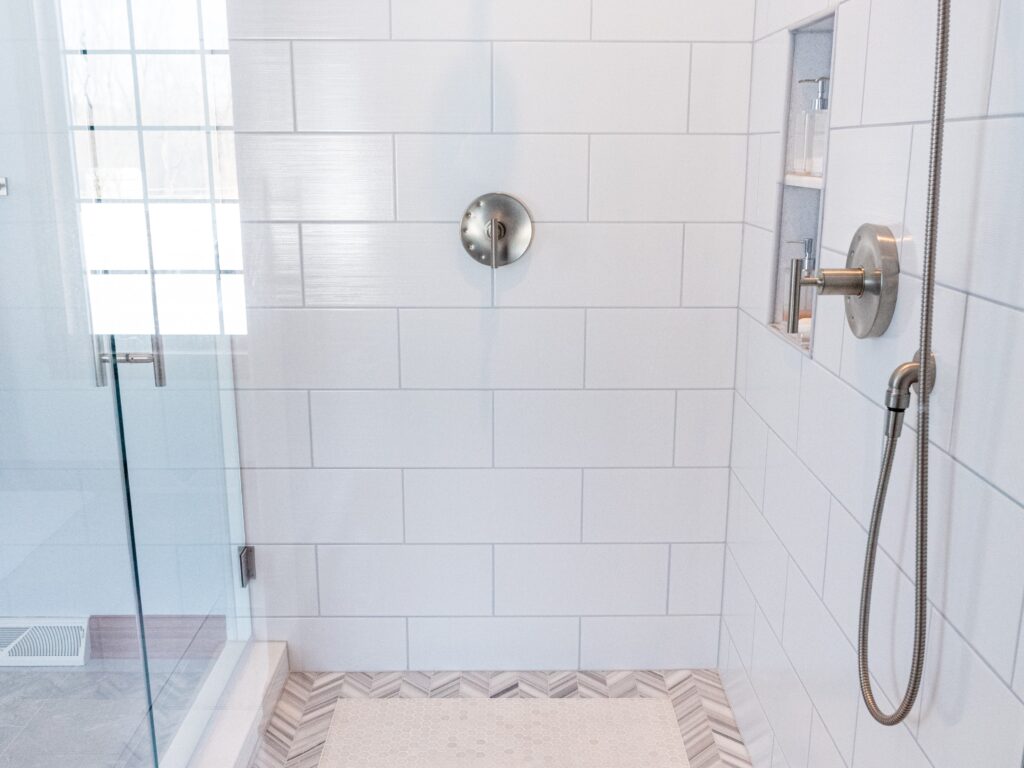
Ceramic tiles are made from natural clay and other materials, which are fired in a kiln to harden. These tiles are a popular choice for bathrooms, both for aesthetic and practical reasons.
Pros of Ceramic Tiles for Showers
Ceramic tiles are made from natural clay and other materials, which are fired in a kiln to harden. These tiles are a popular choice for bathrooms, both for aesthetic and practical reasons.
- Affordability: Ceramic tiles tend to be more budget-friendly than porcelain tiles, making them an attractive option for homeowners on a tight budget.
- Wide Variety: With countless design options, ceramic tiles can easily fit into any bathroom aesthetic, whether you prefer classic white or bold, patterned designs.
- Ease of Installation: Ceramic tiles are typically easier to cut and install, which can reduce labor costs and project time.
- Comfortable to the Touch: Because ceramic tiles are slightly softer than porcelain, they tend to feel warmer and more comfortable underfoot.
Cons of Ceramic Tiles for Showers
- Porosity: Ceramic tiles are more porous than porcelain, which makes them less water-resistant. This could lead to moisture absorption if not properly sealed, increasing the risk of mold or mildew.
- Durability: Ceramic tiles are softer and less dense than porcelain, which means they are more prone to cracking or chipping, especially in high-traffic areas like a shower.
- Maintenance: While ceramic tiles are easy to clean, their porous nature means they may require regular sealing to protect them from water damage over time.
Porcelain Tiles: Pros and Cons
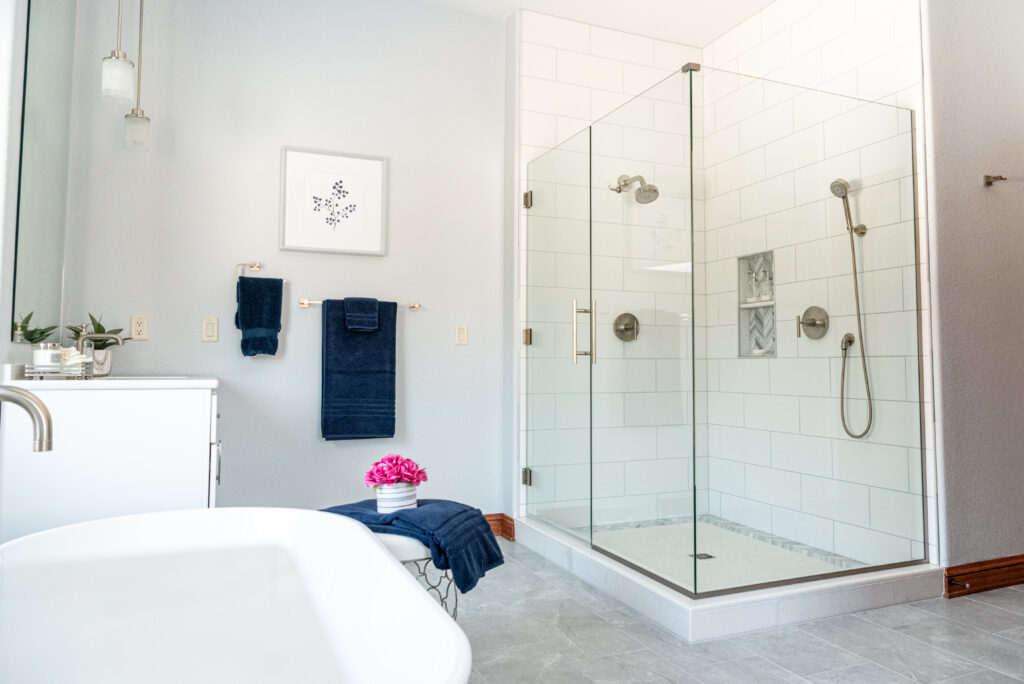
Porcelain tiles are a type of ceramic tile, but they are made from a denser, finer clay and fired at higher temperatures. These tiles are often used in high-moisture environments like bathrooms and showers for their resilience and long-lasting qualities.
Pros of Porcelain Tiles for Showers
- Water Resistance: Porcelain tiles are highly water-resistant, making them an ideal choice for shower walls and floors where moisture exposure is constant.
- Durability: These tiles are incredibly strong and durable, which makes them less likely to chip, crack, or wear down over time.
- Low Maintenance: Porcelain tiles are less porous than ceramic tiles, meaning they make for a very low-maintenance shower. They are also less susceptible to mold, mildew, or staining.
- Aesthetic Appeal: Porcelain tiles are available in a variety of finishes, including options that mimic natural stone or wood, providing a high-end look without the associated cost.
Cons of Porcelain Tiles for Showers
- Higher Cost: Porcelain tiles tend to be more expensive than ceramic tiles, both in terms of material and installation costs.
- Challenging Installation: Due to their density and hardness, porcelain tiles are more difficult to cut and install. This often results in higher labor costs and longer installation times.
- Cold to the Touch: Porcelain tiles can feel colder underfoot than ceramic, which may be less comfortable for some homeowners in cooler climates.
Ceramic vs Porcelain Tiles for Shower Replacement
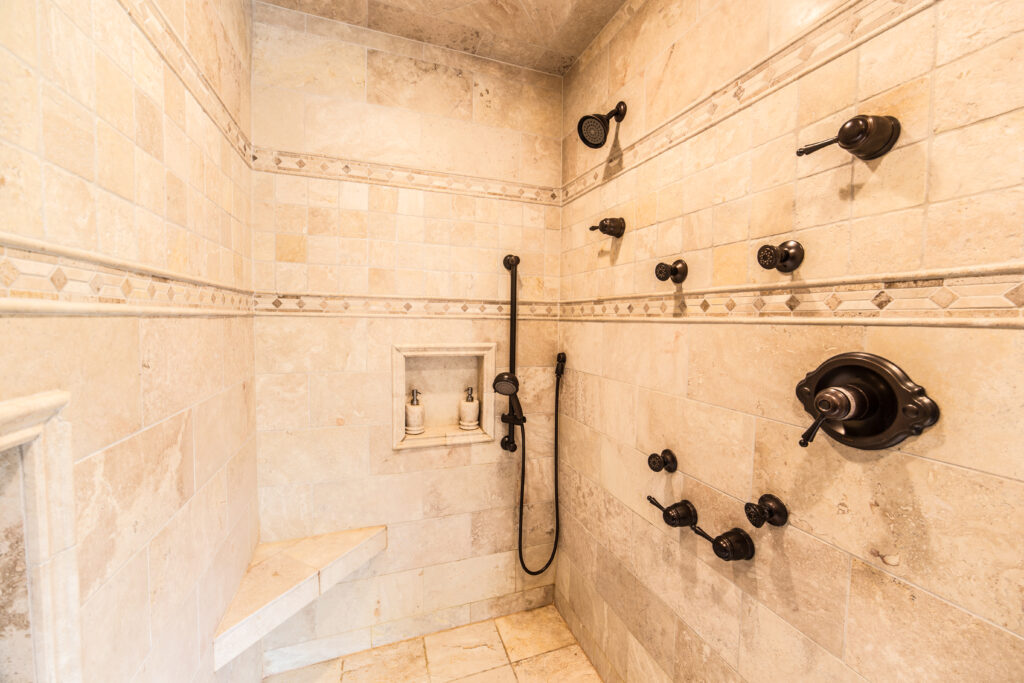
When it comes down to it, when you’re deciding between ceramic and porcelain tiles for a shower replacement, several factors should be considered, including your budget, the level of moisture exposure in your bathroom, and your aesthetic preferences.
Budget
If cost is a primary concern, ceramic tiles are generally the more affordable option. However, porcelain tiles offer greater long-term durability, which might save you money on future repairs or replacements.
Moisture Exposure
For showers that experience heavy water exposure, porcelain is the better choice due to its superior water resistance. Ceramic tiles may require more upkeep and sealing to prevent moisture damage.
Design & Style
Both materials come in a variety of styles, but porcelain tiles tend to offer more high-end, luxurious options that can mimic the look of natural stone or other materials. If you want a custom, designer feel, porcelain is often the way to go.
What Tiles Should Not Be Used in a Shower?
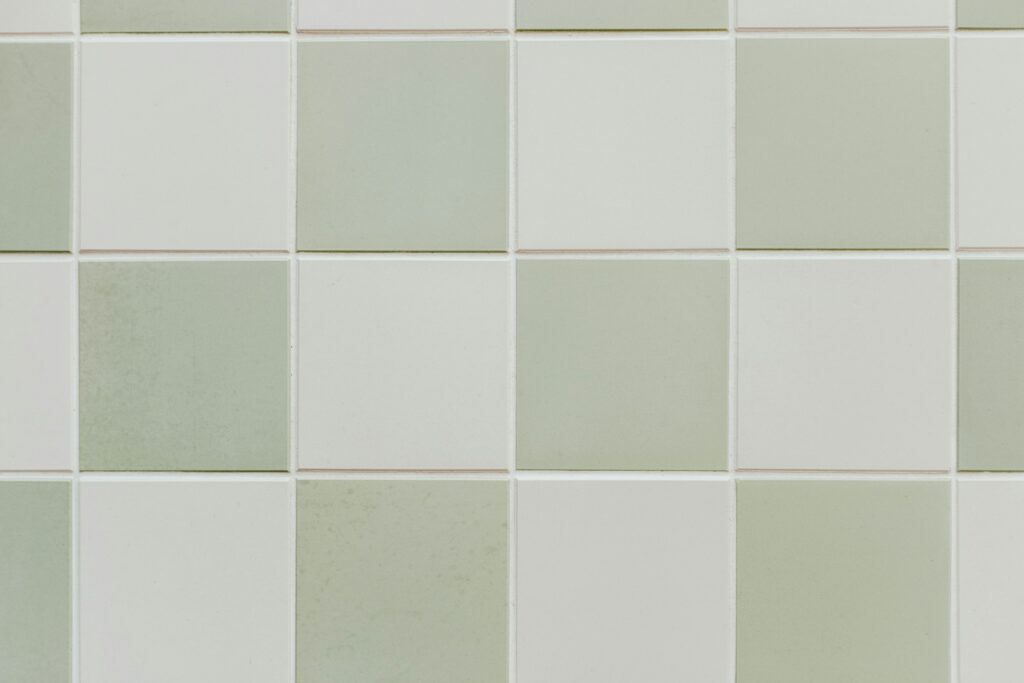
While ceramic and porcelain tiles are both suitable for showers, some materials should be avoided. Natural stone tiles like marble or limestone, for example, are porous and can absorb water. This leads to discoloration, mold, and damage over time. Additionally, glazed tiles with high gloss finishes may become too slippery when wet, creating a safety hazard in the shower.
It’s important to consult with a professional installer, like The Tile Group, to ensure you choose the best material for your specific needs and to avoid any issues down the road.
Our Shower Replacement Projects
Expert Tile Shower Replacement in Milwaukee, WI
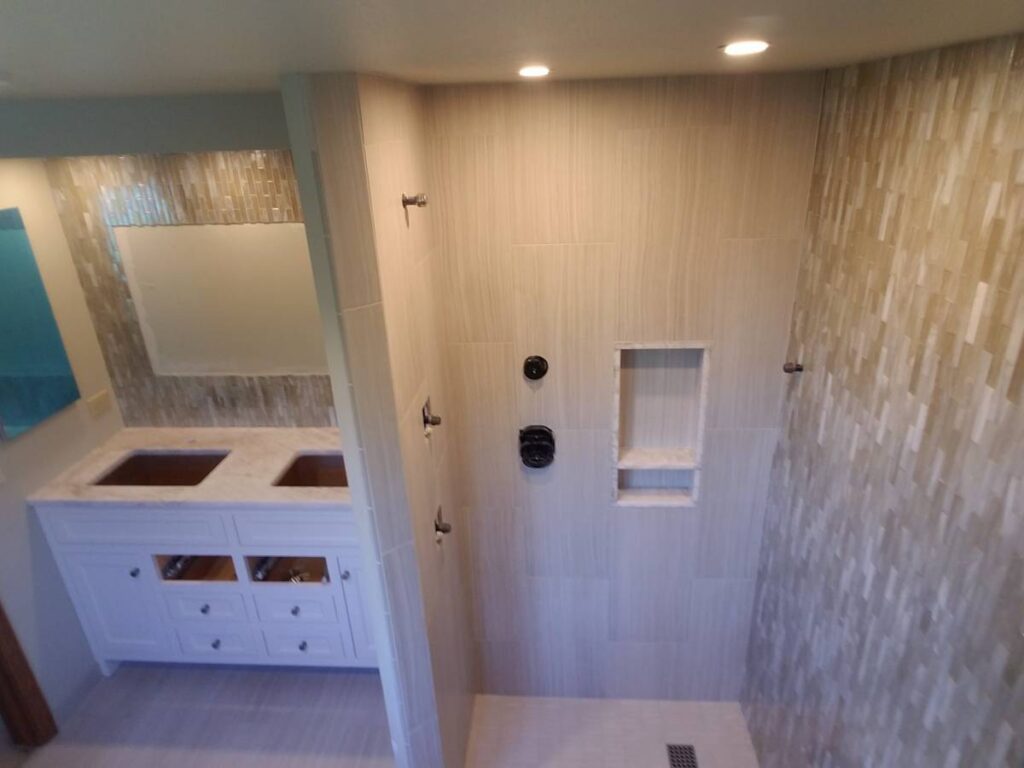
When it comes to selecting tiles for your bathroom, understanding the differences between ceramic vs porcelain tiles for shower applications is crucial. While ceramic tiles offer a budget-friendly and versatile option, porcelain tiles stand out for their durability and water resistance.
Whether you’re planning a full shower replacement, or just upgrading your existing space, both ceramic and porcelain tiles have their advantages. Consider your budget, maintenance needs, and style preferences when making your decision. Most importantly, trust the professional tile installers at the Tile Group to help guide you through the process. Contact us today for a free estimate!

